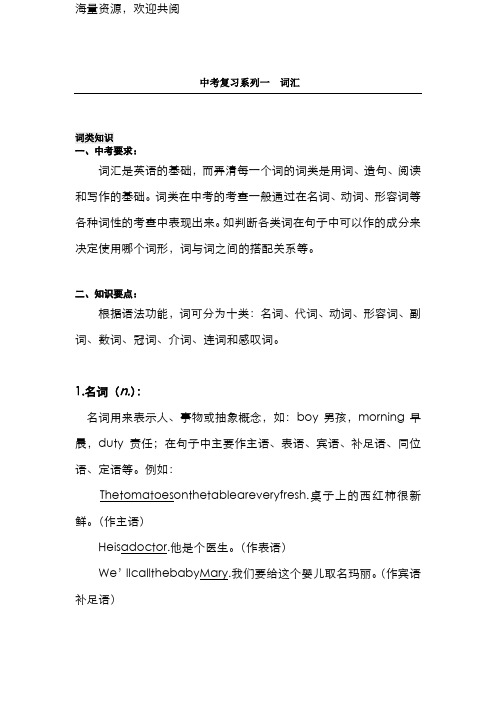江苏中考英语复习之14张图,10个基础知识点
九张图帮你补齐初、高中英语基础知识!错过可惜!

九张图帮你补齐初、高中英语基础知识!错过可惜!
众所周知,英语作为一门基础学科,存在着系统性,连贯性的特点。
教学上对学生原有的基础、学习习惯、学习能力以及兴趣爱好都有较高的要求。
有的同学基础扎实,英语成绩较优异。
而有的同学,英语是它的薄弱学科。
经过一段时间的对比观察,我发现英语薄弱班的学生大多存在以下问题:
1、两极分化严重,E段生太多,A、B段生没有;
2、缺乏良好的英语学习习惯,学生都太懒散,对英语不感兴趣;
3、学生的训练量不够,没有足够的时间来解决英语学习的问题,在校时间基本没有听说的时间,一天一堂课,没有时间读写;
4、基础知识打得不牢,无论是语法还是词汇,学生们对所学过的知识掌握的都不牢固。
针对以上这些情况,我就对初、高中英语基础知识做了一个归类总结,希望可以帮到大家!。
【中考复习资料】初中英语复习知识点汇总

②Knock sb∕sth into a cocked hat
远远胜过某人(或事物);大大超过;是相形见绌
L
lead:引导;指引;领导;名词,铅
lead to导致;通向
leader:n领袖
leadership:n领导力
leave:vi离开
leave for去往,使某人或某物处于某种状态
date:vt约会;n日期
date sb,约会某人
depen:vi依靠,依赖
depend on依赖,取决于
①dependent:adj依靠的,依赖的②dependence:n依赖,依存,瘾,相关(性),依存(关系)③independent:adj独立的
describe:vt描述
①description:n描述
C
calendar:n日历
cancel:vt取消
capital:n首都,资本,大写字母;adj死刑的,大写的,极好的
comfortable:adj舒服的
be comfortable with自在的
①uncomfortable:adj不舒服的②comfort:n舒服;vt安慰
culture:n文化
cultural:adj文化的
⑤过去进行时
②一般现在时
④一般将来时
⑥现在完成时
常考被动语态
①一般现在时②一般过去时③一般将来时
非谓语动词(动词不定式做宾语.宾语补足语.目的状语)
中考高频词
高频词
常用搭配
衍生词汇
A
able:adj有能力的
be able to do sth
有能力做某事
enable:vt使......能,可以用来替换make
人教版中考英语复习教材核心词汇知识点精讲精练九年级全册Unit13-Unit14

9. 采取行动 10. 对……产生影响或作用 11. 扔掉; 抛弃 12. 好好利用某物 13. 拆下; 摧毁 14. 恢复; 使想起; 归还 15. 有创意 16.io_n_ _m__a_k_e_a_d__if_fe_r_e_n_c_e_t_o_ _t_h_r_o_w__a_w_a_y_ _p_u_t_s_t_h_. _to__g_o_o_d_u__se_ _p_u_l_l _. _. _. _d_o_w_n_ _b_r_in__g_b_a_c_k_ _h_a_v_e_a__c_re_a_t_i_v_e_m__in_d_ _t_u_r_n_u_p_s_i_d_e_d_o_w__n_
【句式填写】 1. 我们正尽力拯救地球! We’re trying _to_ _s_a_v_e the earth! 2. 哦, 为了减少空气污染, 我们应该乘公共汽车或坐地铁代替开车。 Well, to cut down air pollution, we _s_h_o_u_ld_ _t_a_k_e the bus or subway instead of _d_r_iv_i_n_g_. 3. 因此, 我们齐心协力就能带来变化, 创造更加美好的未来。 So together, our actions _c_a_n_ _m__a_k_e _a_ _d_i_ff_e_r_e_n_c_e and _le_a_d_ _t_o a better future!
人教版中考英语复习教材核心词汇知识点精讲精练 九年级全册 Units13~14
基础梳理 夯实竞争力
【核心词汇】 1. 乱扔 v. 垃圾; 废弃物 n. 2. 底部; 最下部n. 3. 渔民; 钓鱼的人n. 4. 煤; 煤块 n. 5. 丑陋的; 难看的adj. 6. 花费v. 花费; 价钱 n. 7. 塑料的 adj. 塑料; 塑胶n.
中考英语总复习知识点

中考复习系列一词汇词类知识一、中考要求:词汇是英语的基础,而弄清每一个词的词类是用词、造句、阅读和写作的基础。
词类在中考的考查一般通过在名词、动词、形容词等各种词性的考查中表现出来。
如判断各类词在句子中可以作的成分来决定使用哪个词形,词与词之间的搭配关系等。
二、知识要点:根据语法功能,词可分为十类:名词、代词、动词、形容词、副词、数词、冠词、介词、连词和感叹词。
1.名词(n.):名词用来表示人、事物或抽象概念,如:boy男孩,morning早晨,duty责任;在句子中主要作主语、表语、宾语、补足语、同位语、定语等。
例如:Thetomatoesonthetableareveryfresh.桌子上的西红柿很新鲜。
(作主语)Heisadoctor.他是个医生。
(作表语)We’llcallthebabyMary.我们要给这个婴儿取名玛丽。
(作宾语补足语)2.代词(pro.):代词用来代替名词或数词,如:we我们,their他们的,that 那个,several几个;在句中主要作主语、宾语、表语、同位语等。
例如:Iknowhersister.Sheisalwaysreadytohelpothers.我认识她妹妹,她乐于助人。
(I和she作主语;her作定语;others作宾语)TheEnglishteacherisnothimselftoday.英语老师今天不舒服。
(作表语)3. 数词(num.)数词表示数目和顺序,即基数词和序数词。
如:one一个,thousand千,twelfth第十二;在句子主要作主语、宾语、表语、定语等。
例如:ThreeofusarefromBeijing.我们中有三个人是北京来的。
(作主语)Youarethesecondonetocometoseeme.你是第二个来看我的人。
(作定语)Wedon’tneedsomanypeople.Weneedonlyfive.我们不需要这么多人,我们只需要五个。
初中英语九年级Unit14知识点考点

Unit 14 Have you packed yet?fi Sorry I couldn ' t get back to you sooner. (P 很1 歉我没能尽快给你回复。
療是在E-mail message回复屮的常用语,句屮“get back to sb的意思是“以后再答复”。
、淹an * t give you a definite answer now but I get back to youab out it soon.我现在不能给你一个明确的回答,但我很快会给麻答复的。
、g In the past twelve months, they ' ve had three major concerts and made a hit 的1 H4 匸个月里,他们鄭叢场较大的音乐会,出版了一张很受欢迎的CD唱片。
幷1)“inthepast+时间屬用于完成时的句子中,表示’在过去的…… 时间里';past是形容词,可以用last来替换,而past/last的后面通常要使用’数字+名词”的结构。
In the past/last two years, she has studied English very hard.在过去的两年里,她一直在努力地学英语。
(2)短语make a hit表示“大获成功”、“(演出等)大受欢迎;受到搦等,hit是名词,表示成功而风行一时的輒如电影,歌曲,演出等。
Zhou Jielun has just made a hit CD.周杰伦刚岀版了一轰动一时的CD。
His song was a great hit.他的歌曲轰动一时。
He made a great hit in teaching.他曾在教学上获得了巨大的成功。
3. And then they ' re going to go on a world tour in which they will perform in ten different cities. (P11 嫌后,他们将去世界各地旅行并在十个城市巡回演出。
中考英语初一至初三全程知识点总结及练习

初一年級(上)【知識梳理】I. 重點短語1. Sit down2. on duty3. in English4. have a seat5. at home6. look like7. look at8. have a look9. come on10. at work11. at school12. put on13. look after14. get up15. go shoppingGAGGAGAGGAFFFFAFAFII. 重要句型1. help sb. do sth.2. What abo ut…?3. Let’s do sth.4. It’s time to do sth.5. It’s time for …6. What’s…? It is…/ It’s…7. Where is…? It’s….8. How old are you? I’m….9. What class are you in? I’m in….10. Welcome to….11. What’s …plus…? It’s….12. I think…13. Who’s this? This is….14. What can you see?I can see….15. There is (are) ….16. What colour is it (are they)? It’s (They’re)…17. Whose …is this? It’s….GAGGAGAGGAFFFFAFAF18. What time is it? It’s….III. 交際用語1. Good morning, Miss/Mr….2. Hello! Hi!3. Nice to meet you. Nice to meet you, too.4. How are you? I’m fine, thank you/thanks. And you?5. See you. See you later.6. Thank you! You’re welcome.7. Goodbye! Bye!8. What’s your name? My name is ….9. Here you are. This way, please.10. Who’s on duty today?11. Let’s do.12. Let me see.IV. 重要語法1. 動詞be的用法;2. 人稱代詞和物主代詞的用法;3. 名詞的單復數和所有格的用法;GAGGAGAGGAFFFFAFAF4. 冠詞的基本用法;5. There be句型的用法。
中考英语总复习知识点

中考复习系列一 词汇 词类知识 一、中考要求:
词汇是英语的基础,而弄清每一个词的词类是用词、造句、阅读和写作的基
础。词类在中考的考查一般通过在名词、动词、形容词等各种词性的考查中表现出来。如判断各类词在句子中可以作的成分来决定使用哪个词形,词与词之间的搭配关系等。
二、知识要点: 根据语法功能,词可分为十类:名词、代词、动词、形容词、副词、数词、
冠词、介词、连词和感叹词。
1. 名词(n.): 名词用来表示人、事物或抽象概念,如:boy 男孩,morning 早晨,duty 责任;在句子中主要作主语、表语、宾语、补足语、同位语、定语等。例如: The tomatoes on the table are very fresh. 桌子上的西红柿很新鲜。(作主语) He is a doctor. 他是个医生。(作表语) We’ll call the baby Mary. 我们要给这个婴儿取名玛丽。(作宾语补足语)
2. 代词(pro.): 代词用来代替名词或数词,如:we 我们,their 他们的, that 那个, several 几个;在句中主要作主语、宾语、表语、同位语等。例如: I know her sister. She is always ready to help others. 我认识她妹妹,她乐于助人。 (I和she作主语;her作定语;others作宾语) The English teacher is not himself today. 英语老师今天不舒服。(作表语)
3. 数词(num.) 数词表示数目和顺序,即基数词和序数词。如:one 一个,thousand 千,twelfth 第十二;在句子主要作主语、宾语、表语、定语等。例如: Three of us are from Beijing. 我们中有三个人是北京来的。(作主语) You are the second one to come to see me. 你是第二个来看我的人。(作定语) We don’t need so many people. We need only five. 我们不需要这么多人,我们只需要五个。(作宾语)
中考英语知识点图解总结

中考英语知识点图解总结Contents1. Parts of Speech2. Tenses3. Active and Passive Voice4. Articles5. Prepositions6. Conjunctions7. Modal Verbs8. Conditional Sentences9. Relative Clauses10. Reported Speech1. Parts of SpeechNoun, pronoun, verb, adjective, adverb, preposition, conjunction, and interjection are the eight parts of speech. They all have their own roles and functions in a sentence.Noun – a word that names a person, place, thing, or idea (e.g. dog, book, happiness) Pronoun – a word used in place of a noun (e.g. he, she, they)Verb – a word that expresses an action or state of being (e.g. run, sleep, is)Adjective – a word that describes or gives more information about a noun (e.g. beautiful, tall, happy)Adverb – a word that gives more information about a verb, an adjective, or another adverb (e.g. quickly, happily, very)Preposition – a word that shows the relationship between a noun or pronoun and other words in a sentence (e.g. in, on, at)Conjunction – a word used to connect words, phrases, or clauses (e.g. and, but, or) Interjection – a word or phrase that expresses a strong emotion (e.g. wow, oops, oh)2. TensesEnglish has three main tenses: past, present, and future. Each tense can be divided into four aspects: simple, continuous, perfect, and perfect continuous.Present Tense:Simple Present – expresses an action that happens regularly or a general statement (e.g. She reads every day.)Present Continuous – expresses an action that is happening at the moment of speaking (e.g. They are playing football.)Present Perfect – expresses an action that happened at an unspecified time before the present moment (e.g. I have seen that movie.)Present Perfect Continuous – expresses an action that started in the past and continues upto the present (e.g. We have been waiting for hours.)Past Tense:Simple Past – expresses an action that happened in the past (e.g. He played basketball yesterday.)Past Continuous – expresses an action that was happening at a particular moment in the past (e.g. I was studying when she called.)Past Perfect – expresses an action that happened before another action in the past (e.g. They had already left when we arrived.)Past Perfect Continuous – expresses an action that had been in progress before another action in the past (e.g. She had been working here for five years before she got promoted.) Future Tense:Simple Future – expresses an action that will happen in the future (e.g. I will call you later.) Future Continuous – expresses an action that will be happening at a particular moment in the future (e.g. They will be celebrating their anniversary at this time next week.)Future Perfect – expresses an action that will be completed before a specific time in the future (e.g. I will have finished my homework by 8 o’clock.)Future Perfect Continuous – expresses an action that will have been in progress before a specific time in the future (e.g. They will have been living in that house for ten years by then.)3. Active and Passive VoiceThe active voice is used when the subject of the sentence performs the action stated by the verb. The passive voice is used when the subject of the sentence receives the action stated by the verb.Active Voice:I wrote the letter. (Subject – I, Verb – wrote, Object – the letter)Passive Voice:The letter was written by me. (Subject – the letter, Verb – was written, Agent – by me)4. ArticlesArticles are used to specify the noun they precede.Definite Article – the (e.g. the book, the car)Indefinite Article – a, an (e.g. a book, an apple)5. PrepositionsPrepositions are used to show the relationship between a noun or pronoun and other elements in the sentence.Some common prepositions: in, on, at, by, for, from, to, with, without, between, among, during, since, until, etc.6. ConjunctionsConjunctions are used to connect words, phrases, or clauses in a sentence.Coordinating Conjunctions – and, or, but, so, yet, for, nor (e.g. I like coffee and tea.) Subordinating Conjunctions – because, although, if, when, while, since, before, after, etc. (e.g.I will go out if it stops raining.)7. Modal VerbsModal verbs express the mood of the speaker and their attitude toward the action or state described by the main verb.Some common modal verbs: can, could, may, might, must, shall, should, will, would, ought to, need, have to, had better, etc. (e.g. You should study hard for the exam.)8. Conditional SentencesConditional sentences are used to talk about a hypothetical situation and its possible result. There are four types of conditional sentences, each with its own structure and usage.Zero Conditional – used to talk about general truths and scientific facts (e.g. If you heat water to 100 degrees, it boils.)First Conditional – used to talk about a real possibility in the present or future (e.g. If it rains, I will stay at home.)Second Conditional – used to talk about an unreal or unlikely possibility in the present or future (e.g. If I won the lottery, I would buy a big house.)Third Conditional – used to talk about an unreal or impossible condition in the past and its hypothetical result (e.g. If I had studied harder, I would have passed the exam.)9. Relative ClausesRelative clauses are used to provide extra information about a noun in a sentence. They begin with relative pronouns (who, whom, whose, which, that) or relative adverbs (when, where, why).The woman who lives next door is a doctor.The book that I bought is very interesting.10. Reported SpeechReported speech is used to report what someone else has said without quoting their exact words. It involves a change in tense, pronouns, and other words to fit the context.Direct Speech: "I am going to the park," she said.Reported Speech: She said that she was going to the park.In conclusion, understanding these key English knowledge points is essential for achieving success in the mid-term examination. By mastering the parts of speech, tenses, active and passive voice, articles, prepositions, conjunctions, modal verbs, conditional sentences, relative clauses, and reported speech, students can communicate more effectively and accurately in English. This knowledge point summary provides a comprehensive guide for students to review and reinforce their understanding of these important concepts.。
